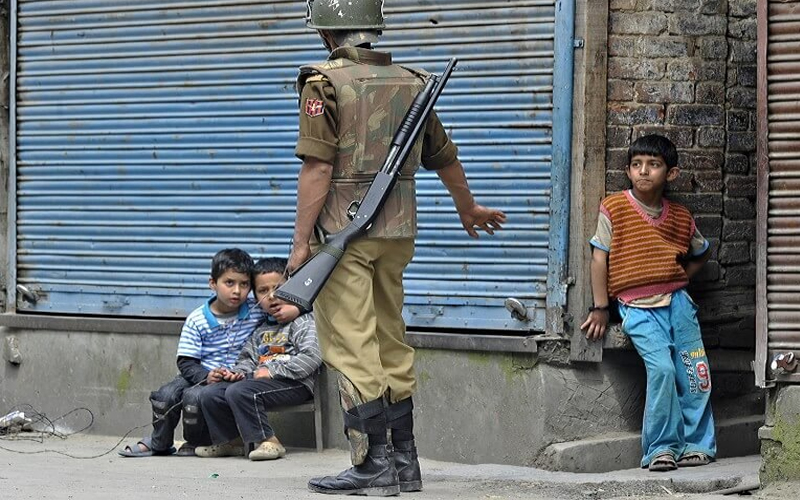Abdul Bari Masoud
New Delhi: Tamil Nadu rights organisation ‘Human Rights Forum for Jammu and Kashmir (HRFJK) on Wednesday released a report on the impact of the lockdowns on the human rights situation in the troubled state of Jammu and Kashmir. It stated that “there has been a near-total alienation of the people of the Kashmir valley from the Indian state and people since the state was put under total lockdown on August 5, 2019 after the Article 370 was unilaterally abrogated by the Center which had accorded special status to the state. The report documented the rights violation instances.
Some three months ago, concerned citizens from Tamil Nadu launched the Human Rights Forum for Jammu and Kashmir with an aim to document rights violations in the state. The forum has academics, activists, civil servants, jurists, and defence experts as its members.
The Report titled, ‘Jammu and Kashmir: Impact of the Lockdowns on Human Rights’ made an effort to document the numerous human rights violations in the former state over the past eleven and a half months (August 4, 2019 to July 19, 2020) under five broad heads such as ‘civilian security, health, children and youth, industry and media’.
Its findings are as follows:
Civilian security
Counter-insurgency concerns have been given absolute priority over public, civilian and human security, leading to an across-the-board violation of human rights, including the vitiation of protections such as habeas corpus, prevention of illegal detention and strict restrictions on arrest and detention of children. There has been a denial of the right to bail and fair and speedy trial, coupled with misuse of draconian legislation, such as the Public Safety Act (PSA) and the Unlawful Activities Prevention Act (UAPA), to stifle dissent.
Health
In the same manner, the eleven months of lockdown, which saw frequent closures, harassment at barricades and checkpoints, and restrictions on mobile telephony and internet connectivity, have enormously impacted public health, and caused trauma and stress amongst the people of Jammu and Kashmir, violating the rights to health and medical care under the Indian, and Jammu and Kashmir, constitutions. The rights of children to a trauma-free environment have been arbitrarily ignored.
Children and youth
The impact on education has been particularly severe. Schools and colleges functioned for barely 100 days between 2019 and 2020 (the bulk of which were pre-August 2019). After the COVID-19 pandemic lockdown, the limiting of networks to 2G has made it impossible for online classes to function adequately. Graduate students and teachers have been unable to participate in conferences or have their papers published, causing wilful harm to their careers and violating the rights to education under the Indian, and Jammu and Kashmir, constitutions.
Local and regional industries suffered heavily
Local and regional industries have suffered large losses in every sector. Many companies that are heavily or solely reliant on 4G networks that are available in the rest of the country, such as tourism and cottage industries, have been forced out of business. The new domicile rules introduced by the Ministry of Home Affairs and the Jammu and Kashmir administration, moreover, erode prior employment protections for permanent residents of the former state.
Local Media and journalists worst sufferers
The local media has been one of the worst sufferers. Journalists have been harassed and even had draconian charges slapped on them, for example under the UAPA. Their content, readership and revenues have suffered such a sharp decline that dozens of journalists have lost their jobs. The new media policy, which introduces censorship by the Directorate of Information and Public Relations (DIPR) in coordination with security agencies, is a death blow to the freedom of the press and the freedom of expression.
Moreover, the Jammu and Kashmir administration’s decision to notify areas of the former state as ‘strategic areas’ for development by the army suggests further expansion of the military presence in hinterland and border areas.”
The Report surmised that the government of India’s actions of abrogation of Article 370, enforcing the lockdown, which closed markets, educational institutions and all public spaces for several weeks and internet and telephone services made disastrous impact on the economic, social and political life in the state.
“All the former state’s industries suffered severe blows, pushing the majority into loan defaults or even closure; hundreds of thousands lost their jobs or underwent salary deferment or cuts; closures of schools and universities gravely impaired education and added to the trauma of children and parents; healthcare was severely restricted by curfew and roadblocks; the local and regional media lost what little independence they had.”

